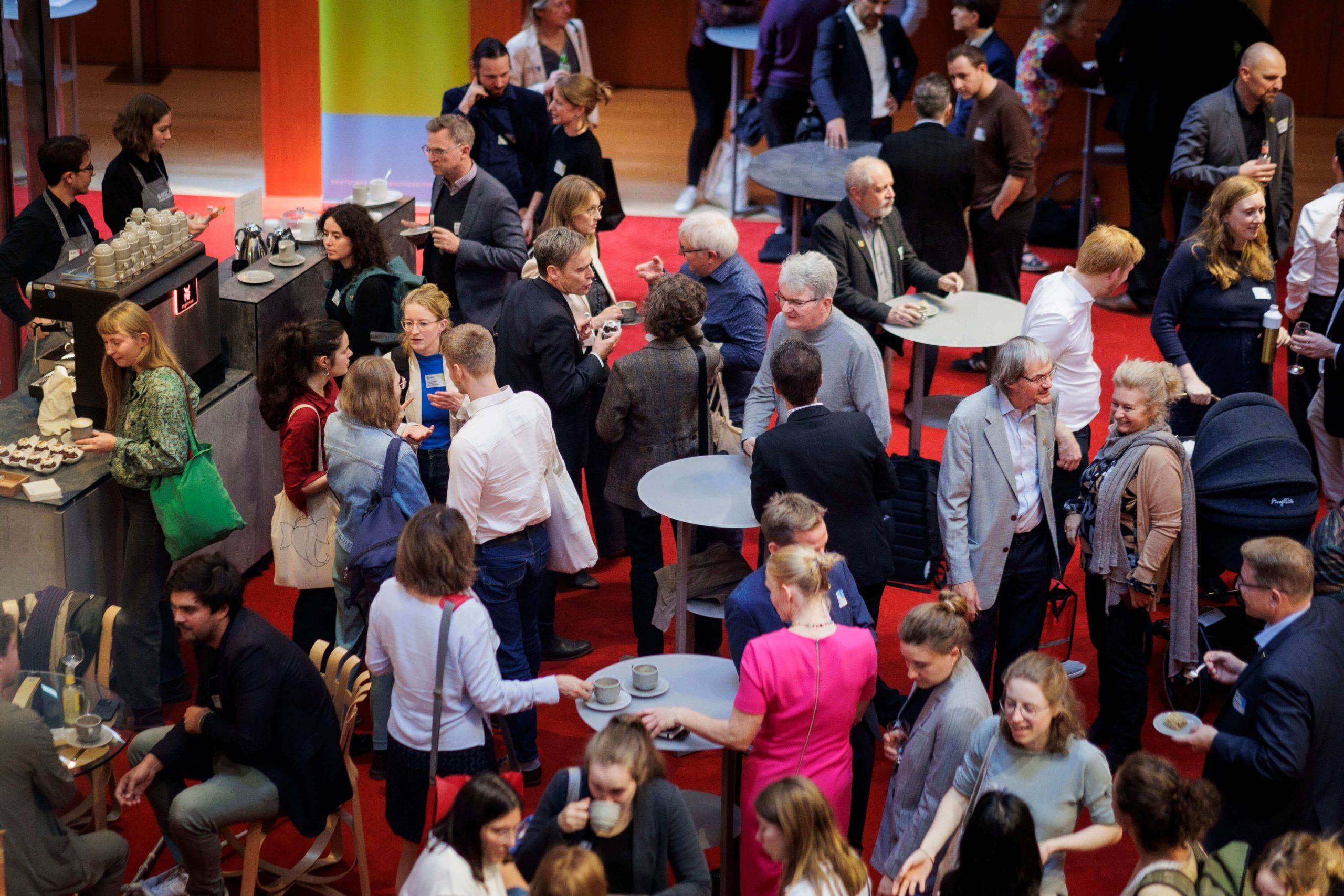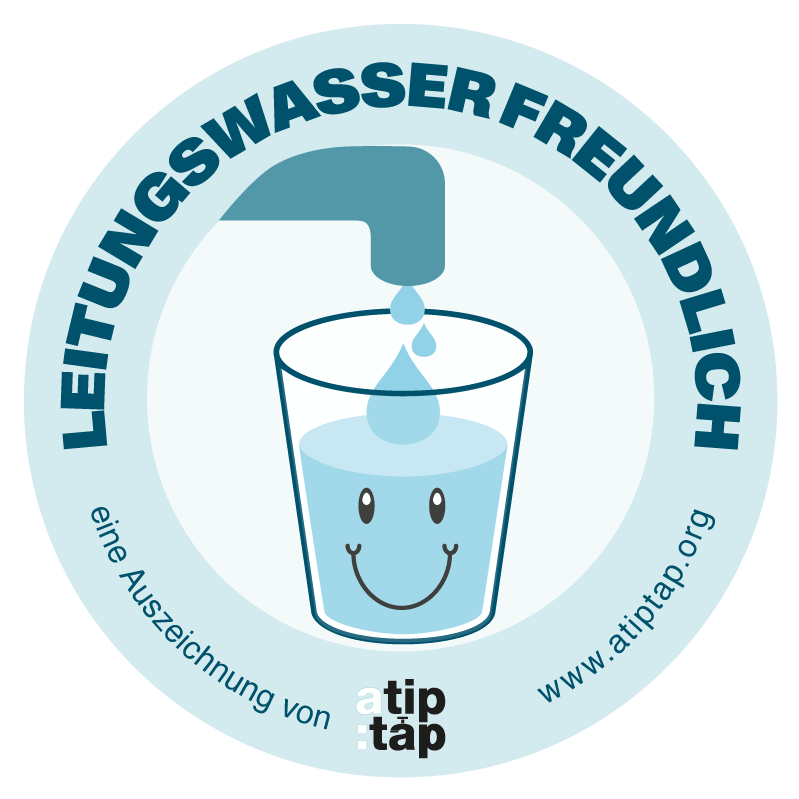The German Council for Sustainable Development plans and realises events according to the criteria of sustainable event management.

23. Jahreskonferenz des Rates für Nachhaltige Entwicklung am 08.10.2024 in Berlin, Foto: photothek © RNE
Der Rat für Nachhaltige Entwicklung plant und realisiert seine Jahreskonferenzen und alle weiteren Veranstaltungen nach den Kriterien eines nachhaltigen Veranstaltungsmanagements. Wir berücksichtigen dabei u.a. den Leitfaden für die nachhaltige Organisation von Veranstaltungen des Umweltbundesamtes (UBA) und des Bundesministeriums für Umwelt, Naturschutz und nukleare Sicherheit (BMU).
Documentation of measures
The measures that have already been accounted for in the sustainability management of Council event planning are summarised below. To arrive at these measures, we jointly reviewed all aspects of the event location and all third-party service providers such as caterers, booth constructors, technology companies and the hotels booked for our guests to identify potential for realisation of the requirements.
For execution of the event, we look for a location that offers the best-integrated sustainability concept possible (green electricity, energy-saving technology, resource conservation, sustainable handling of paper and cleaning agents, water-saving toilet flush systems and washing and toilet fittings, use of sustainable material like FSC paper, etc.). This also includes constructional aspects like sufficient natural light, energy-efficient insulation, energy-optimised air conditioning and heating technology (Federal Ministry for the Environment, Nature Conservation and Nuclear Safety recommendation: do not heat conference rooms above 20 °C and do not let them cool off to more than 6 °C below outdoor temperature) as well as separated waste collection and waste disposal (e.g. installation of recycling bins). It is also important to us that the event location compensate for all unavoidable emissions, such as through donations to climate protection projects.
We set great store by reusing materials and construction components and that construction elements be made from recyclable materials. For the directional signage and signage for stage and other objects, we use products made of recyclable materials or renewable raw materials. Alternatively, we use durable products designed for further use. In our cooperation with service providers, we give priority to those that structure their operations in an environmentally friendly manner.
If hired furnishings are used, we are careful to select a service provider that does not have to travel far. We strive to use reusable furnishings made from renewable raw materials and employ constructional elements and materials made according to current environmental standards (ISO standards, life cycle assessments) or from recycled materials. We avoid choosing non-durable plastic furniture.
We select an event location that is easily reachable via public transport. We ask our guests to travel to the event via public transport and provide space to park bicycles at the event location. For longer-distance travel, we book Deutsche Bahn’s event ticket and offer it to our guests. For the transfer from train station to event location, we recommend public transport. We make recommendations for hotels located near the event location that ideally also have environmental certification (e.g. Green Certified, Bio-Hotel, Green Key, EMAS). A livestream enables other interested parties to participate in the event remotely.
In 2024, Deutsche Bahn, in cooperation with the German Council for Sustainable Development, once again made it possible to travel to the conference CO2-free. The electricity required for the journey was sourced entirely from renewable sources.
Together with an agency, we execute the invitation process entirely electronically and avoid using paper as far as possible, both in the run-up to the event and on the event day itself. We reduce the guest no-show rate to approximately 10 to 20 per cent (based on experience of past years) by sending reminder emails and requesting that recipients send a cancellation if participation is not possible.
For the event’s catering, we select a regional caterer with proven sustainability in operations. Sustainable operations include the use of water-saving appliances in the kitchen (e.g. industrial dishwashers and among other things the use of biodegradable cleaning agents), avoidance of food waste (during planning, preparation, portioning and disposal), avoidance of unnecessary packaging and single-use packaging as well as small bottle sizes. We expect the caterer to use multiple-use dishes, cutlery and glasses, for both guest and crew catering. We require that the kitchen be equipped with appropriate collection bins for professional disposal of food waste. The caterer should donate unprocessed food to charitable organisations (e.g. Berliner Tafel e.V.) – insofar as hygiene regulations are maintained. We offer the guests the possibility to take home leftover food from the buffet via “Beste-Reste-Boxen” (tasty take-home boxes).
The caterer procures the food mainly from regional suppliers and in returnable deposit crates. The selection of dishes is vegetarian or vegan, regional, seasonal and certified (organic, MSC, fair trade, Naturland, Demeter, etc.). We avoid serving exotic dishes and fruits. We prioritise fresh food. We use as few convenience products and as little frozen food as possible.
The beverages we offer are: tap water in carafes, organic and fair trade coffee and tea, regional juices and organic wine, organic beer on tap from regional breweries and organic bottled beer.
As far as possible, we avoid using decoration materials for giveaways and gifts to speakers, and where used, we use compostable natural materials.

The German Council for Sustainable Development has been certified as tap water friendly by a tip: tap e.V.. Internally and at events, only tap water is available at the RNE.
Disabled access is a prerequisite for inclusivity and an important component of a sustainable society. The possibility for all to participate is important to us. The aim is for persons both with and without disability to be able to participate in our events without substantial obstacles and as and how they choose. Nevertheless, we are well aware that we are only beginning to tackle this task.
Currently, we take care that the event location provides for disabled access and that language barriers are removed through translation and, if required, the use of sign language. In addition, we ask participants to notify us in advance of any special assistance needed so that we can assess whether concrete support beyond the measures offered will be necessary.
As far as possible we avoid using paper-based documents at the conference and neither give guests presents nor use marketing materials. The conference programme and conference documents are provided electronically. We print the name tags on-site (on paper or fabric) and thus avoid postal transport.
We incorporate the sustainability measures implemented into live communication for the event and report on the realised sustainability measures on our website. One of our aims is to sensitise the participants during the event to forms of sustainable behaviour.
Virtual and hybrid events produce fewer greenhouse gas emissions and use fewer resources compared to their in-person counterparts. This is because fewer or even no guests travel to the event, which in turn reduces the environmental footprint caused by both transport and accommodation – a significant saving, as the primary environmental impact of events usually stems from participants travelling to and from them. Event venue must-haves are also changing. These days, there is less and less need for a venue – where there is a need at all. This lowers resource consumption, for example for lighting, ventilation and heating, decoration or cleaning.
That said, it is difficult to calculate how much switching from in-person to virtual events really saves, as many of the actions that generate emissions or consume resources are simply shifted to the participants’ individual spaces, where they can be neither influenced nor measured by the organiser but instead only estimated. While catering is no longer needed at a shared event venue, participants still have to eat as they attend virtually through their mobile devices at home or in their own offices. Of course, the organiser knows neither where the food comes from, how it is prepared or what it is made up of. Those attending online also use their own heating, electrical appliances and sanitary facilities instead of those at the event venue. If they had travelled to the event, they would largely have avoided using these.
There are also new sources of emissions. Streaming an event, for example, produces levels of emissions that are hard to ignore. A study conducted by the German Environment Agency from autumn 2020 concluded that the share of CO2 emissions generated by data processing in a data centre is relatively low, at 1.5 grammes of CO2 per hour. In fact, it is the technology used to transmit data from the centre to individual users that is the game changer for cloud service climate compatibility, such as for video streaming. This ranges greatly from the relatively climate-friendly fibre optic cable (2 grammes of CO2 per hour) to 5G transmission technology (5 grammes of CO2 per hour). What is more, this estimate is yet to take into account the power consumed by participants’ mobile devices. This varies depending on whether they use, for instance, an old stand-alone PC or a brand-new laptop – which has a significantly larger environmental footprint – or whether they utilise energy-saving browser settings like adblockers.
Lastly, virtual event organisers are increasingly turning to pre-produced film clips. These can be created with sustainability in mind, for example in terms of energy supply and on-set mobility or catering. The RNE, for instance, recognised the Green Film Shooting initiative for its work in the film industry as part of Project Sustainability (read our reports, e.g. here, only in German).